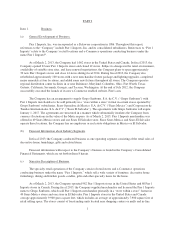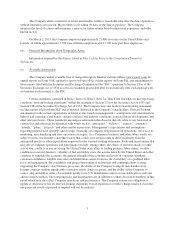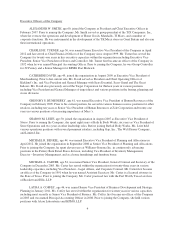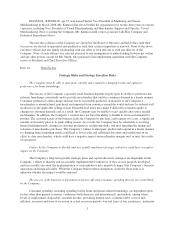Pier 1 2013 Annual Report Download - page 17
Download and view the complete annual report
Please find page 17 of the 2013 Pier 1 annual report below. You can navigate through the pages in the report by either clicking on the pages listed below, or by using the keyword search tool below to find specific information within the annual report.Governmental agencies have the authority to enforce trade agreements, resolve trade disputes, and control
market access to goods and services. Governments may also impose trade sanctions on foreign countries that are
deemed to violate trade agreements or maintain laws or practices that are unjustifiable and restrict commerce. In
these situations, governments may increase duties on imports from one or more foreign countries. In this event,
the Company could be negatively affected by the imposition of trade sanctions.
In addition, the governments of the countries in which the Company does business maintain a variety of
additional international trade laws under which the Company’s ability to import may be affected from time to
time, including antidumping laws, countervailing duty laws, safeguards laws, and laws designed to protect
intellectual property rights. Although the Company may not be directly involved in a particular trade dispute
under any of these laws, its ability to import, or the terms and conditions under which it can continue to import,
may be affected by the outcome of such disputes.
In particular, because the Company imports merchandise from countries around the world, the Company
may be affected from time to time by antidumping petitions filed with the United States and international
agencies by U.S. producers of competing products alleging that foreign manufacturers are selling their own
products at prices in the United States that are less than the prices that they charge in their home country market
or in third country markets or at less than their cost of production. Such petitions, if successful, could
significantly increase the United States import duties on those products. In that event, the Company might decide
to pay the increased duties, thereby possibly increasing the Company’s price to consumers. Alternatively, the
Company might decide to source the product or a similar product from a different country not subject to
increased duties or else discontinue the importation and sale of the product.
In recent years, dispute resolution processes have been utilized to resolve disputes regarding market
access between the European Union, China, the United States and other countries. In some instances, these trade
disputes can lead to threats by countries of sanctions against each other, which can include import prohibitions
and increased duty rates on imported items. The Company considers any agreement that reduces tariff and non-
tariff barriers in international trade to be beneficial to its business. Any type of sanction on imports is likely to
increase the Company’s import costs or limit the availability of merchandise purchased from sanctioned
countries. In that case, the Company may be required to seek similar merchandise from other countries.
Risks Relating to Liquidity
A disruption in the global credit and equity markets could negatively impact the Company’s ability to
obtain financing on acceptable terms.
In the future, the Company could become dependent on the availability of adequate capital to fund its
operations. Disruption in the global credit and equity markets and future disruptions in the financial markets
could negatively affect the Company’s ability to enter into new financing agreements or obtain funding through
the sale of Company securities. A decline in economic conditions could also result in difficulties for financial
institutions and other parties that the Company does business with, which could potentially affect the Company’s
ability to access financing under existing arrangements or to otherwise recover amounts as they become due
under the Company’s contractual agreements. The inability of the Company to obtain financing as needed on
acceptable terms to fund its operations may have a negative impact on the Company’s business and financial
results.
Insufficient cash flows from operations could result in the substantial utilization of the Company’s
secured credit facility, which may limit the Company’s ability to conduct certain activities.
The Company maintains a secured credit facility to enable it to issue merchandise and special purpose
standby letters of credit as well as to fund working capital requirements. Borrowings under the credit facility are
11
























